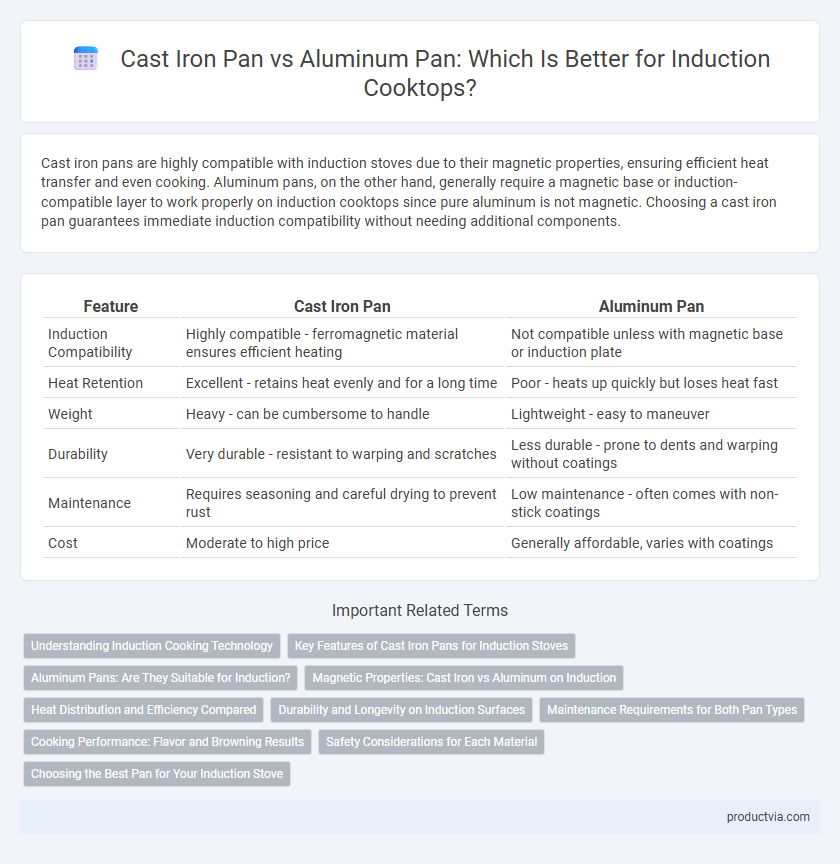Cast iron pans are highly compatible with induction stoves due to their magnetic properties, ensuring efficient heat transfer and even cooking. Aluminum pans, on the other hand, generally require a magnetic base or induction-compatible layer to work properly on induction cooktops since pure aluminum is not magnetic. Choosing a cast iron pan guarantees immediate induction compatibility without needing additional components.
Table of Comparison
| Feature | Cast Iron Pan | Aluminum Pan |
|---|---|---|
| Induction Compatibility | Highly compatible - ferromagnetic material ensures efficient heating | Not compatible unless with magnetic base or induction plate |
| Heat Retention | Excellent - retains heat evenly and for a long time | Poor - heats up quickly but loses heat fast |
| Weight | Heavy - can be cumbersome to handle | Lightweight - easy to maneuver |
| Durability | Very durable - resistant to warping and scratches | Less durable - prone to dents and warping without coatings |
| Maintenance | Requires seasoning and careful drying to prevent rust | Low maintenance - often comes with non-stick coatings |
| Cost | Moderate to high price | Generally affordable, varies with coatings |
Understanding Induction Cooking Technology
Cast iron pans excel with induction stoves due to their ferromagnetic properties, ensuring efficient heat transfer and consistent cooking performance. Aluminum pans typically lack magnetic conductivity unless equipped with a specially designed magnetic base, which is necessary for compatibility with induction cooktops. Understanding induction cooking technology reveals that the key factor for pan compatibility is the ability to generate a magnetic field, making ferromagnetic materials essential for optimal energy efficiency.
Key Features of Cast Iron Pans for Induction Stoves
Cast iron pans are ideal for induction stoves due to their excellent magnetic properties, ensuring efficient heat transfer and even cooking. Their heavy, durable construction retains heat longer, making them perfect for consistent temperature maintenance on induction cooktops. Unlike aluminum pans, cast iron's magnetic base is fully compatible with induction technology, providing superior performance without the need for additional cookware adapters.
Aluminum Pans: Are They Suitable for Induction?
Aluminum pans are generally not suitable for induction cooking because aluminum is non-magnetic and cannot generate the necessary electromagnetic field to heat on an induction stove. However, aluminum pans with a magnetic stainless steel base or induction-compatible coating can work efficiently on induction cooktops. Cast iron pans remain the most reliable choice due to their inherent ferromagnetic properties, ensuring rapid and consistent heating on all induction surfaces.
Magnetic Properties: Cast Iron vs Aluminum on Induction
Cast iron pans have excellent magnetic properties, making them highly compatible with induction stoves by effectively generating heat through magnetic induction. Aluminum pans lack inherent magnetism, rendering them incompatible with induction cooktops unless they feature a magnetic stainless steel base. The magnetic permeability of cast iron ensures efficient energy transfer and consistent cooking temperatures on induction surfaces.
Heat Distribution and Efficiency Compared
Cast iron pans offer excellent heat retention and even distribution, making them highly efficient for induction stoves by providing consistent cooking temperatures. Aluminum pans, while lightweight and quick to heat, often require a magnetic stainless steel base to be compatible with induction cooktops, affecting overall heat efficiency. The magnetic properties of cast iron enhance induction energy transfer, resulting in more effective heat utilization compared to aluminum pans.
Durability and Longevity on Induction Surfaces
Cast iron pans exhibit exceptional durability and longevity on induction stoves due to their dense, ferromagnetic properties that ensure consistent heat distribution and resistance to warping. Aluminum pans typically require a magnetic stainless steel base for induction compatibility, which may compromise their overall durability and cause uneven wear over time. The inherent robustness of cast iron makes it a superior choice for sustained use on induction surfaces, maintaining performance without sacrificing structural integrity.
Maintenance Requirements for Both Pan Types
Cast iron pans require regular seasoning to maintain their non-stick surface and prevent rust, while aluminum pans often feature anodized coatings that reduce maintenance but may wear over time. Cast iron's heavier weight demands careful cleaning and drying to avoid corrosion, whereas aluminum pans generally need gentle washing to preserve their finish and avoid warping. Both pan types benefit from avoiding abrasive cleaning tools, but cast iron's durability suits long-term use with consistent maintenance, contrasting with aluminum's lighter, less demanding upkeep.
Cooking Performance: Flavor and Browning Results
Cast iron pans offer superior heat retention and even cooking, which enhances flavor development and achieves better browning results on induction stoves. Aluminum pans, while heating quickly, often deliver less consistent temperature control, leading to uneven browning and reduced flavor depth. For optimal cooking performance on induction cooktops, cast iron provides enhanced sear quality and richer taste profiles.
Safety Considerations for Each Material
Cast iron pans offer superior induction stove compatibility due to their magnetic properties, ensuring stable heating and reducing risks of uneven cooking or accidents. Aluminum pans require a magnetic base layer to work safely on induction surfaces, as pure aluminum is non-magnetic and can cause heating issues or damage if used directly. Safety considerations highlight cast iron's durability and heat retention, while aluminum pans need careful verification of induction compatibility to prevent hazards.
Choosing the Best Pan for Your Induction Stove
Cast iron pans provide excellent induction stove compatibility due to their magnetic properties, ensuring efficient heat transfer and even cooking. Aluminum pans require a magnetic stainless steel base to work on induction cooktops, as pure aluminum is not naturally compatible. Choosing the best pan for your induction stove depends on prioritizing durability and heat retention with cast iron or lightweight convenience with specially designed aluminum pans.
Cast iron pan vs Aluminum pan for induction compatibility Infographic

 productvia.com
productvia.com